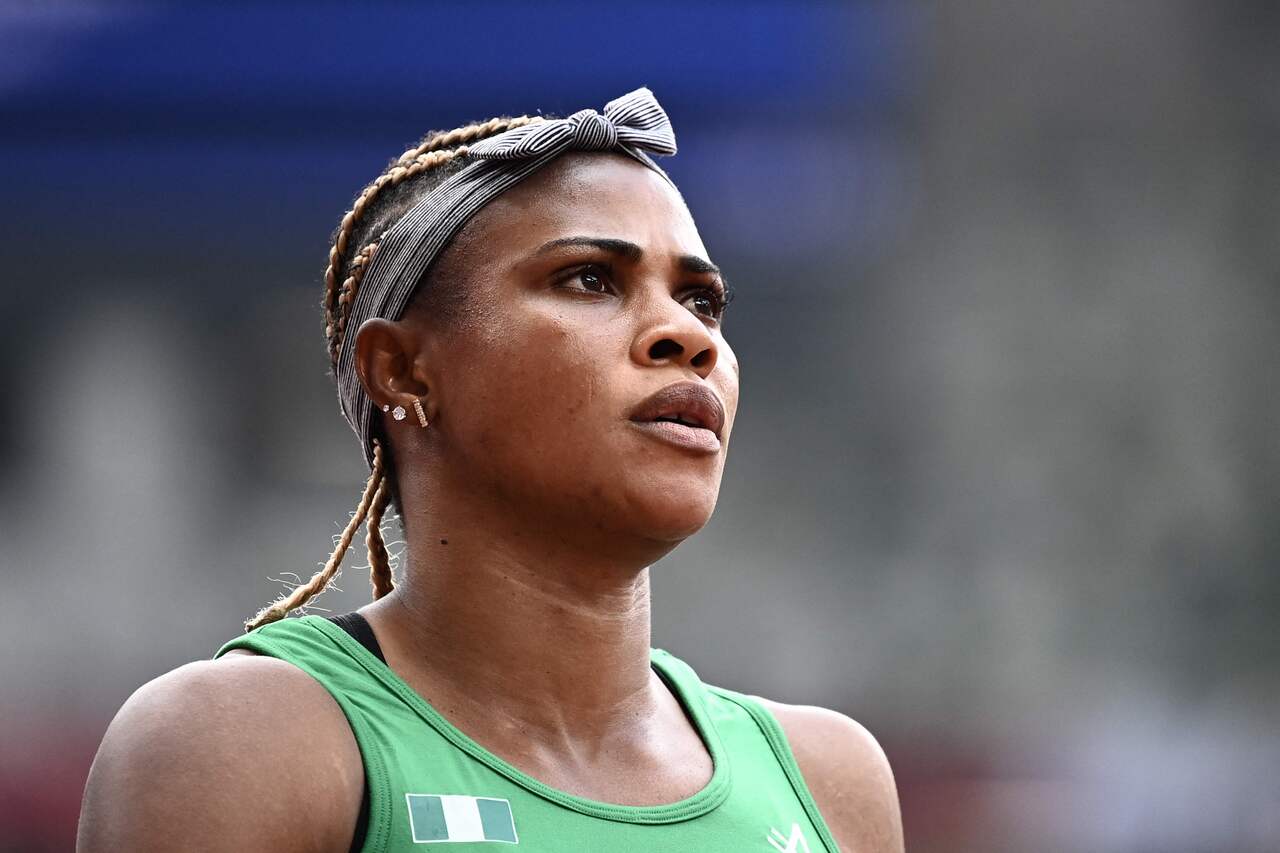Olympics: Sprinters Nigeria's Blessing Okagbare and Kenya’s Mark Otieno out of Tokyo Games after failed drug test
Sign up now: Get the biggest sports news in your inbox

Blessing Okagbare won her opening heat in the women's 100m on Friday in 11.05sec.
PHOTO: AFP
TOKYO (NY TIMES, REUTERS) - Track and field's drug-testing agency temporarily suspended a Nigerian sprinter after a failed test, the first drug-related suspension of an active athlete at the Tokyo Games.
In a statement, the Athletics Integrity Unit, which runs the anti-doping program for the sport, said a sample collected from the sprinter, Blessing Okagbare, during an out-of-competition test on July 19 had tested positive for growth hormones.
Kenya's Mark Otieno, a 100m sprinter, has also been provisionally suspended and will not take part in Saturday's (July 31) qualifiers after testing positive for a banned substance, Team Kenya said in a statement.
"We have received communication this afternoon from International Testing Agency (ITA) regarding one of our sprinters who has had an Adverse analytical finding on a urine sample he provided on 28 July 2021," said Waithaka Kioni, Team Kenya's Head of Delegation.
"We have received communication this afternoon from International Testing Agency (ITA) regarding one of our sprinters who has had an Adverse analytical finding on a urine sample he provided on 28 July 2021," said Waithaka Kioni, Team Kenya's Head of Delegation.
Asked if he could confirm that the sprinter in question was Mark Otieno, a Team Kenya spokesman replied: "Yes."
"He has, however, denied any knowledge of the violation and has subsequently requested a re-analysis of his B urine sample," Kioni said.
Otieno, who has a personal best of 10.05sec, finished second at the national trials last month.
He told Reuters this month that he was looking forward to changing perceptions of Kenya in the 100m, a distance in which the east African nation, one of the most world's successful countries in long-distance running events, has not enjoyed much success.
Otieno's withdrawal left Ferdinand Omanyala as Kenya's only entrant in the men's 100m at the Games.
He served a 14-month doping ban imposed by the Anti-Doping Agency of Kenya in 2017.
"He has, however, denied any knowledge of the violation and has subsequently requested a re-analysis of his B urine sample," Kioni said.
Otieno, who has a personal best of 10.05sec, finished second at the national trials last month.
He told Reuters this month that he was looking forward to changing perceptions of Kenya in the 100m, a distance in which the east African nation, one of the most world's successful countries in long-distance running events, has not enjoyed much success.
Otieno's withdrawal left Ferdinand Omanyala as Kenya's only entrant in the men's 100m at the Games.
He served a 14-month doping ban imposed by the Anti-Doping Agency of Kenya in 2017.
Okagbare, 32, won her opening heat in the women's 100m on Friday in 11.05sec and had been scheduled to run in the semi-finals on Saturday (July 31).
Okagbare's suspension was not the first testing-related problem for Nigeria's track and field competitors at these Games.
On Thursday, the Athletics Integrity Unit declared 20 Olympic track and field athletes ineligible to compete because they had not met out-of-competition testing requirements leading up to the Olympics. Of the 20 athletes, 10 were from Nigeria.
The Athletic Federation of Nigeria, the governing body for sports in the country, issued a statement attributing the problem to an administrative failure and not to any positive tests for banned substances. The athletes were declared ineligible to compete because they had not completed the required three out-of-competition tests, the organisation said.
"The AFN bears responsibility for any lapses that may have occurred during the process and reassures Nigerians that our performances will not be negatively impacted," the organisation said.
In a separate statement, the country's ministry of sport also clarified that none of the 10 athletes in question had tested positive for a banned substance.
Chioma Onyekwere, a Nigerian discus thrower who is ranked No. 16 in the world and whose event was scheduled for Saturday, was among those disqualified.
She said she and her teammates who were affected by the ruling had learned of the news Thursday night from officials with the country's Ministry of Youth and Sports Development and the Athletic Federation of Nigeria.
"I think we were all shocked," Onyekwere said.
"Everyone was in disbelief that this could be happening."
On Friday, all 10 of the athletes who had been disqualified from the Games held a protest in Tokyo, where they walked through the Olympic Village with signs that read "All we wanted to do is compete" and "Why should we suffer because of someone else's negligence?"
"It is a painful thing to be at your peak and not be able to compete," Onyekwere, 23, said from her room in the Olympic Village as she watched her competition live on her computer.
Already the Nigerian record-holder in women's discus, Onyekwere had wanted to break the African record at the Games, she said.
Tokyo would have marked the Olympic debut of all 10 Nigerian athletes.
"It hurts," Chidi Okezie, who had been set to compete in the 4x400m mixed relay, said in a message, adding a broken heart emoji.
Now, because they are not competing, the athletes have to leave Tokyo on Sunday.
On Thursday, before Okagbare's suspension was announced, the youth and sports ministry issued a statement saying that 12 athletes from the country's track and field team had been cleared to participate in the Games.
The world's anti-doping organisations have long struggled to oversee consistent testing across numerous countries, a challenge made worse by the pandemic. In the months before the Rio de Janeiro Games in 2016, more than 1,900 athletes across 10 key sports - including track and field, weightlifting and cycling - were not tested, a failure that anti-doping officials vowed would not be repeated in the next Olympic cycle.


